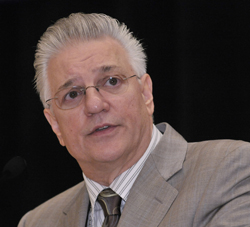AN INTERVIEW WITH TCU PRESIDENT BOB SCARDELLETTI
Recently Published in the IAM Journal
 Q: Negotiations with the national freight carriers opened on January 1, 2010. What should TCU members expect in this bargaining round?
Q: Negotiations with the national freight carriers opened on January 1, 2010. What should TCU members expect in this bargaining round?
Bob Scardelletti: This promises to be the toughest bargaining round we’ve faced in decades. Wages and health insurance will be the battle lines. The railroads point to the recession – traffic is down, thousands of employees are furloughed. The carriers have already made it clear they are seeking far-reaching changes to our insurance plan. They point to last year’s double-digit increase in the cost of the plan, even though benefits stayed the same.
Q: What is your response?
Bob Scardelletti: We will fight for wage increases that reflect the railroad’s long term health, not the short term economic downturn that will certainly end, hopefully sooner rather than later. Long term the railroad industry has perhaps the brightest prospects of any American industry. In that regard we agree with Warren Buffett.
Even today rail freight profits are strong, stock prices are solid. Going forward the industry will benefit from ever increasing global trade. Unique among American industry, the railroads face no foreign or domestic start-up competition. There are no bankrupt railroads.
I will continue TCU’s policy of standing arm in arm with the railroads against external threats to their economic health, whether it be shipper efforts to reregulate rates or attacks on coal production. My view is that the stronger the industry is economically, the more jobs are available for our members, and the more the industry can afford to pay our members’ wages and health insurance.
But the key is that this industry is not structurally hurting. Each railroad’s on a level playing field with the others in terms of labor costs. Rail workers play a vital part in the industry’s success, and the upcoming contract should reflect that.
Q: What about the carriers’ stated priority to bring down the costs of the National Health Plan?
Bob Scardelletti: I guess we’re headed for a collision, because protecting our health plan is my top priority. Our Plan does what it’s supposed to. It protects our members when they need medical care without bankrupting them. Our members are already paying enough. My goal is to hold the line. It’s a cost of doing business. You cannot bring down costs without bringing down benefits, or cost shifting, and we will fight that with all our power.
Q: Is the bargaining outlook as tough in other negotiations?
Bob Scardelletti: Unfortunately, yes. Most of our commuter and transit contracts are either in negotiations now, or will be soon. And in each case the public agency is facing unprecedented budget deficits, and political pressure to scapegoat the workers. But just like with the freight railroads, we take the long view. We will fight with everything we have to make sure that the current fiscal crisis does not become a pretext to roll back the historically good wages and benefits our commuter and transit members have earned.
Q: What about Amtrak?
Bob Scardelletti: Amtrak is a different story. Last round Amtrak engaged in the sorriest, most inexcusable bargaining strategy I’ve ever seen. They set out to starve our members into concessions, and put our members through eight years of hell. In the end we prevailed and achieved a good contract.
But in my mind Amtrak needs to demonstrate that it has changed its ways by stepping to the plate and making a fair contract immediately, one with good wages and that holds the line on employee insurance contributions. Thanks to President Obama and the Democratic majorities in Congress, Amtrak has the funds to do it. I will do everything in my power to reach a fair settlement quickly.
Q: Overall what message do you have for your members?
Bob Scardelletti: It’s going to be real hard. But we are ready for the fight and we will get the very best contracts possible.